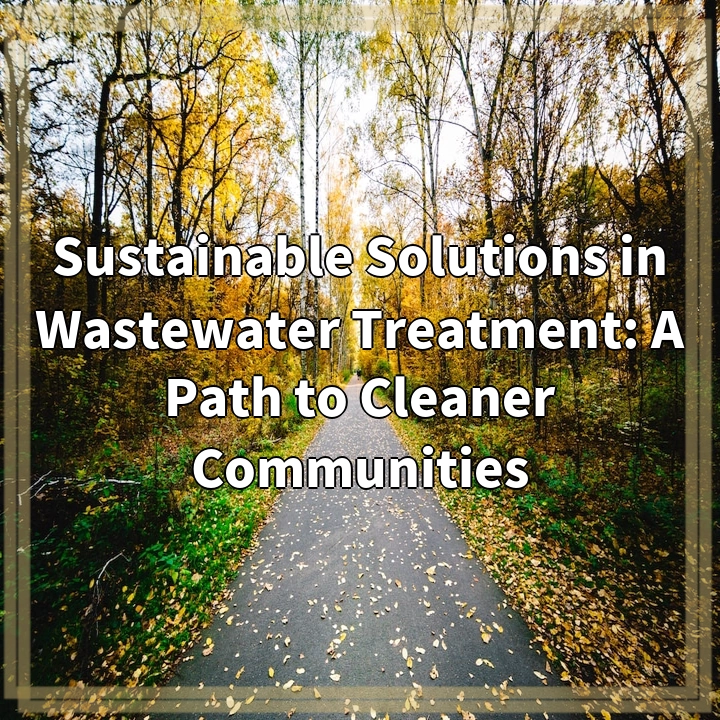
What is Sustainable Solutions in Wastewater Treatment?
Wastewater treatment is a crucial process for ensuring that our communities have access to clean and safe water. It involves the collection, treatment, and disposal or reuse of wastewater from residential, industrial, and commercial sources. Sustainable solutions in wastewater treatment refer to the use of environmentally-friendly and resource-efficient techniques and technologies to achieve this goal.
Real-World Problems in Wastewater Treatment
Despite the importance of wastewater treatment, there are several real-world problems that need to be addressed in order to ensure cleaner communities. These issues include:
1. Water Pollution
Improper or inadequate wastewater treatment can lead to the release of pollutants into rivers, lakes, and oceans. This can harm aquatic ecosystems, disturb biodiversity, and impact public health. The presence of pollutants such as chemicals, pathogens, and heavy metals in wastewater can result in long-term environmental repercussions.
2. Energy Consumption
Traditional wastewater treatment processes are often energy-intensive. The energy required for pumping, aeration, and other treatment processes contributes to greenhouse gas emissions. High energy consumption not only adds to the carbon footprint but also increases operational costs for treatment plants. Finding sustainable solutions that reduce energy consumption is crucial for mitigating the environmental impact of wastewater treatment.
3. Water Scarcity
In many regions, water scarcity is becoming a pressing issue. Wastewater, if properly treated, can be a valuable resource for non-potable uses, such as irrigation and industrial processes. However, limited infrastructure and lack of awareness often result in the underutilization of treated wastewater. Enhancing water reuse practices and promoting the benefits of recycled water can help address water scarcity concerns.
4. Aging Infrastructure
Many wastewater treatment facilities around the world are aging and in need of upgrades or replacements. The maintenance and renovation of infrastructure present significant challenges in terms of costs, logistics, and disruptions during construction. To ensure the effective treatment of wastewater and the proper functioning of treatment plants, investments in infrastructure improvements and modernization are crucial.
5. Compliance with Regulations
Governments and regulatory bodies have established guidelines and standards for wastewater treatment to protect human health and the environment. However, compliance with these regulations can be a challenge for some treatment plants, particularly smaller ones with limited resources. Meeting and exceeding regulatory requirements are essential to ensure the sustainable management of wastewater and to prevent legal and environmental consequences.

Solutions for Sustainable Wastewater Treatment
In order to address the real-world problems associated with wastewater treatment, several sustainable solutions can be implemented. These solutions include:
1. Advanced Treatment Technologies
Implementing advanced treatment technologies such as membrane filtration, activated sludge processes, and biological nutrient removal can improve the efficiency and effectiveness of wastewater treatment. These technologies help remove a wider range of pollutants and produce higher-quality treated water while minimizing the energy and chemical requirements.
2. Energy Efficiency Measures
Adopting energy-efficient practices can significantly reduce the carbon footprint of wastewater treatment. This includes optimizing pump and blower systems, using renewable energy sources, and implementing energy-saving measures such as process improvements and heat recovery. Energy audits and management programs can help identify areas for improvement and track energy consumption.
3. Water Reuse and Resource Recovery
Promoting water reuse and resource recovery from wastewater can reduce the strain on freshwater sources and contribute to a circular economy. Treated wastewater can be used for purposes such as irrigation, industrial processes, and even drinking water in some cases. Additionally, valuable resources such as phosphorus and nitrogen can be recovered from wastewater and used as fertilizers.
4. Infrastructure Upgrades and Maintenance
Investing in infrastructure upgrades and regular maintenance is crucial for ensuring efficient and reliable wastewater treatment. This includes repairing aging pipes, renovating treatment plants, and implementing smart monitoring and control systems. Proper infrastructure management helps prevent leaks, reduce energy losses, and improve overall system performance.
5. Education and Awareness
Raising awareness about the importance of proper wastewater treatment and the benefits of sustainable solutions is essential for widespread adoption. Public education campaigns, community engagement initiatives, and capacity-building programs can help change behaviors, promote responsible water use, and encourage individuals and businesses to support and invest in sustainable wastewater treatment practices.















